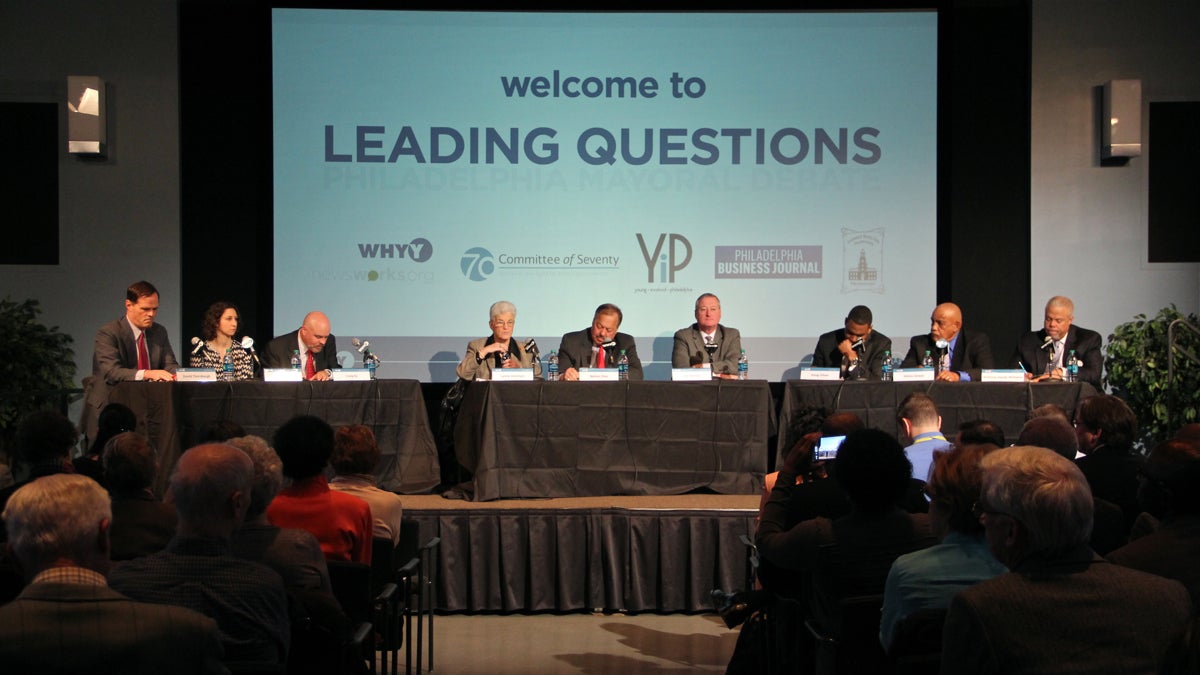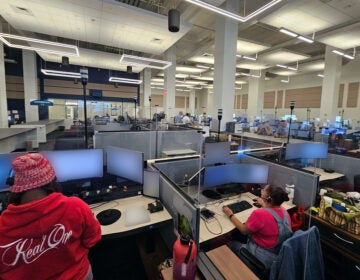Topic du jour at WHYY’s Leading Questions debate: Johnny Doc

The six Democratic candidates for mayor attend a the WHYY Leading Questions Debate (Emma Lee/WHYY)
Just before the end of Monday morning’s “Leading Questions” mayoral debate at WHYY’s Hamilton Public Media Commons, candidate Jim Kenney was asked a pointed two-part question.
It was as follows:
Controversial union leader John Dougherty is obviously one of the strong backers of your campaign, financially and otherwise.
Two-part question: What do you say to critics who claim that Dougherty would have too much influence in city government if you win? And, would you appoint him to any office?
After noting that he can’t envision appointing Local 98’s business manager to any position/office in a potential Kenney adminstration, the former city councilman said, “He will not have any undue influence. I know how to say no.”
Suffice it to say, candidates Tony Williams and Nelson Diaz — both are often vocally critical of Kenney’s labor support — took exception.
Moments later, Williams noted that Kenney ran at Doughtery’s behest while Diaz floated the idea that there “is some ethics violation in this process” without getting specific.
The rules of the debate — which was co-sponsored by WHYY, the Committee of Seventy, the Philadelphia Business Journal and Young Involved Philadelphia — held that Kenney couldn’t respond directly at that moment.
But, the candidates’ closing arguments started shortly thereafter, and Kenney used part of his time to fire back.
“Contrary to a recent assertion, I got into the race to help and support working families meet their potential,” he said, not for “three hedge-fund billionaires who want to privatize public education.”
A few seats away, Williams — at whom the privatization dig was leveled — wore a steely gaze, reacting to something he’s heard numerous times before. He didn’t resuscitate the issue during his closing statement, but the exchange already sat atop the debate’s heated-moments list.
Questions asked
The debate — which will air in its entirety at 9 p.m. Monday on WHYY-FM 90.9 — was geared away from the issues. The moderators were David Thornburgh (CEO, Committee of Seventy), Craig Ey (editor-in-chief, Philadelphia Business Journal) and Katie Colaneri (reporter, WHYY).
Instead, questions were designed to “zero in on leadership and the managerial demands of being chief executive of a city of 1.4 million people,” said Chris Satullo, WHYY’s vice president of news and civic dialogue, in his introductions.
That’s just what they did, with questions for the group about:
— Sharing a time they said something they regretted, and lessons learned from that experience,
— What was the largest annual budget they’ve ever controlled directly,
— Name at least one person that, as mayor, they would like to have on their staff (and why), and
— What current leader in business, politics or any field do you admire most and why?
There were also individual questions asked of one candidate, or selected candidates:
— Candidates’ experience representing the city’s interests in Harrisburg (to Lynne Abraham, Diaz and Kenney),
— What initiative they would start pushing right away if elected (to Doug Oliver, Milton Street and Williams),
— Name a time when outside events — something beyond their control — scrambled their plans and forced them to adjust and recover in a successful way (to Diaz, Kenney and Oliver),
— How would someone who worked for Abraham, Street and Williams describe the culture they created as a leader,
— Abraham, Kenney and Williams were asked to discuss “a time when you were able to convince people to change, hopefully for the better,”
— Since Diaz was the city’s top lawyer during the first term of John Street’s administration, “which was plagued with accusations and investigations of pay-to-play, how can we be sure that a Diaz administration would be one that embraces clean government?” and
— If Williams were to be elected, for what should voters and the media hold him accountable?
Questions answered
While you can hear all the exchanges when the debate airs on WHYY-FM 90.9 at 9 p.m., here are a few highlights:
Asked why honest taxpayers should elect a man who was found guilty of not filing tax returns on nearly $3 million dollars’ worth of income and whether he can you be trusted with taxpayer money, Street offered a two word reply: “Yes,” he can be trusted and “no,” he didn’t wish to expand as to why.
Asked how citizens can have confidence in a mayoral candidate with no similar executive experience, Oliver responded that “this is a job no one up here has done before” and noted leadership/executive aspects of his previous jobs.
Abraham noted that she’d lobbied both Harrisburg and Washington D.C. to bring about laws protecting crime-victims’ rights, notably not having to face the accused “eyeball-to-eyeball” in court for sensitive cases of sexual assault and child abuse. (Abraham’s “I’m proud of my record” as district attorney comment also drew a quick press-release response from the Kenney campaign, stating, in part, that she “was criticized by the Philadelphia Inquirer Editorial Board for repeatedly failing to prosecute political corruption.”)
Williams said that, upon election, he would return to City Council and revisit efforts to sell Philadelphia Gas Works. He also harkened back to a resume and track record of a candidate (himself) who has had to make things happen in Harrisburg to help consitutents back home, and proudly noted that despite his portrayal as the race’s “charter school guy,” not one candidate on the stage with him is against those educational opportunities.
Diaz rued the fact that the media confused his “passion as anger” at his campaign-launch event, noting the fact that he’s driven by a passion to fix things (most notably the schools) instead of anger about issues.
On that same question, Kenney brought up comments from 1997 which have resurfaced over the course of the mayoral campaign.
Specifically, it was about the time when he said “If you want to do surgery on him, cut his hand off” about a man charged with two murders. His comments on Monday:
“It was a stupid thing to say,” he said, chalking it up to an emotional moment talking about an case that infuriated him. “I wouldn’t say the same thing today.”
When the topic of whether government should be run like a business, the lone dissenting votes were Kenney and Williams, who said businesses are based more on profit than helping constituents.
WHYY is your source for fact-based, in-depth journalism and information. As a nonprofit organization, we rely on financial support from readers like you. Please give today.




